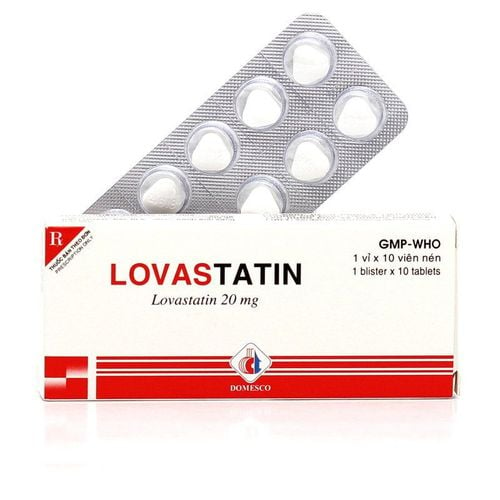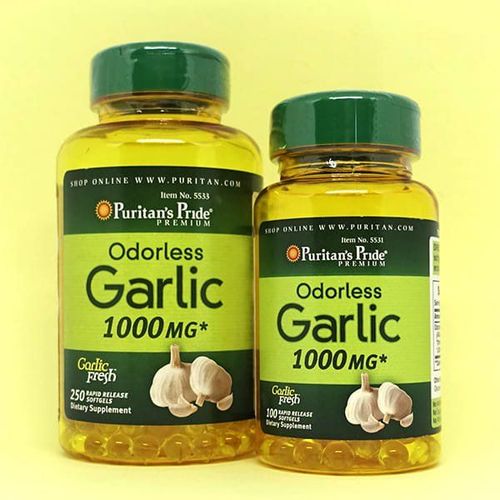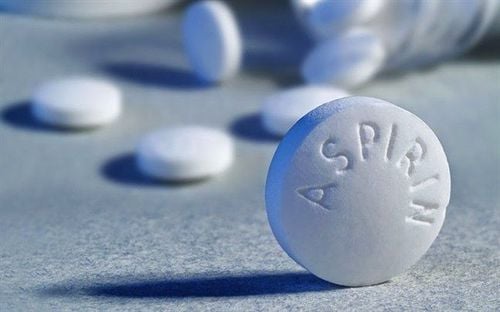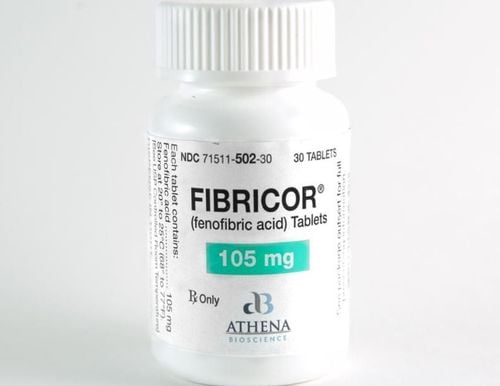This is an automatically translated article.
Statins are a group of drugs commonly used for the purpose of controlling blood cholesterol and preventing atherosclerotic plaques. One of the active ingredients in this group is Lovastatin in the product Altocor. So what is Altocor and how does it work?
1. What is Altocor?
Altocor contains the active ingredient Lovastatin, which works to lower blood cholesterol through the mechanism of blocking cholesterol production.
Altocor can reduce the concentration of LDL and total cholesterol in the blood, helping to prevent cardiovascular disease and atherosclerosis, thereby limiting the risk of heart attack, stroke and other diseases. vascular management.
2. Some warnings when taking Altocor
In rare cases, the use of Altocor has resulted in rhabdomyolysis and acute renal failure. Therefore, users should contact their doctor if they have symptoms such as unexplained muscle pain or tension, muscle weakness, high fever, flu-like symptoms, and dark urine.
Altocor can cause birth defects in the fetus, so it is contraindicated for use in pregnant women. Patients should use effective contraception and promptly notify their doctor if an unplanned pregnancy occurs during treatment with Altocor. In addition, Altocor products are contraindicated for use in people with liver disease or nursing mothers.
Before taking Altocor, tell your doctor about any existing medical conditions, including diabetes, hypothyroidism, impaired kidney function, muscle disease or blood clotting disorders.
During treatment, the patient should limit the consumption of foods high in fat or cholesterol. The effectiveness of Altocor in controlling blood cholesterol may be impaired if the patient does not adhere to the appropriate diet.
Patients should limit the use of alcohol while using Altocor. This is because alcohol can increase triglyceride levels or increase the risk of liver damage when taken with Altocor .
In terms of drug interactions, there are many different drugs that can interact with Altocor. Therefore, patients need to discuss with the treating doctor all the drugs they are using, and do not arbitrarily add or stop using any drugs during the use of Altocor.
Problems patients need to discuss with their doctor before using Altocor:
History of allergy to Lovastatin, pregnancy or breast-feeding; History of liver disease, diabetes, hypothyroidism, kidney disease, or muscle disorders. Another issue to keep in mind is that Altocor is not indicated for use in children under 10 years of age.
3. Instructions for using Altocor
Patients should take Altocor exactly as recommended or prescribed by the treating doctor. Note: Do not arbitrarily increase or decrease the dose of Lovastatin or use it for longer than prescribed.
When using, patients should take Altocor with plenty of water, and do not crush, chew or break the extended-release tablet dosage form of this product. Swallowing the tablet whole is consistent with the dosage form so that the active substance Lovastatin is released slowly in the body. Breaking or chewing the tablet may cause too much Lovastatin to be released all at once.
The most suitable time to use Altocor is before going to bed or with dinner. In case the doctor instructs you to take Altocor several times a day, the patient should take the drug with meals.
To ensure the effectiveness of Altocor in each specific patient requires periodic blood cholesterol testing, in addition to regular liver function tests.
It should be noted that Altocor is only one part of a complete cholesterol control treatment program. Besides strictly following a suitable diet, exercising regularly and controlling weight.
Most of the indicated cases will have to use Altocor long-term to control high cholesterol as optimally as possible.
4. Some problems to avoid when using Altocor
Limit foods containing a lot of fat or cholesterol due to the risk of affecting the therapeutic effect of Altocor; Limit alcohol consumption during blood cholesterol treatment with Altocor. Alcohol or alcoholic beverages can increase triglyceride levels and increase the risk of liver damage; Grapefruit and grapefruit juice can interact with Altocor and lead to dangerous effects. Patients should discuss the use of grapefruit with their doctor, and should not change the amount of grapefruit and grapefruit-based products in their daily diet without the consent of the treating doctor.
5. Side effects of Altocor
Patients who are being treated with Altocor and have symptoms of an allergic reaction such as skin rash, difficulty breathing, swelling of the face, lips, tongue or throat... should immediately contact a medical emergency. to be dealt with in a timely manner.
Stop using Altocor and contact a doctor immediately if the patient has any of the following serious side effects:
Muscle pain; Pain, muscle weakness with high fever, flu-like symptoms and dark urine. In addition, Altocor can cause some less serious side effects, including:
Mild epigastric pain; Flatulence, abdominal distension; Heartburn; Nausea; Constipation; Diarrhea. The above is not a complete list of possible side effects when using Altocor. If there are any other abnormalities related to Altocor, the patient should promptly report it to the treating doctor for intervention.
6. Drug interactions of Altocor . products
Many products or active ingredients can interact with Altocor when taken together, which may include:
cholestyramine (Questran) or Colestipol (Colestid); Danazol (Danocrine); Gemfibrozil (Lopid), Clofibrate (Atromid-S) or Fenofibrate (Tricor); Niacin (Nicolar, Nicobid, Slo-Niacin); Nefazodone (Serzone); Amiodarone (Cordarone), Diltiazem (Cartia, Cardizem, Dilacor, Tiazac) or Verapamil (Verelan, Calan, Isoptin); Medicines that suppress the immune system such as cancer drugs or corticosteroids, Cyclosporine (Neoral, Sandimmune, Gengraf), Sirolimus (Rapamune), Tacrolimus (Prograf), and others; medication for depression such as Amitriptyline (Elavil, Etrafon), Desipramine (Norpramin), Fluoxetine (Prozac), Fluvoxamine (Luvox), Imipramine (Janimine, Tofranil), Nefazodone (Serzone), or Paroxetine (Paxil); Antibiotics Erythromycin, Clarithromycin or Telithromycin; antifungal medicine such as Itraconazole (Sporanox), Fluconazole (Diflucan), or Ketoconazole (Nizoral); Anticoagulants such as Warfarin (Coumadin); HIV/AIDS medicine such as Nelfinavir (Viracept) or Ritonavir (Norvir). Altocor contains the active ingredient Lovastatin, which works to lower blood cholesterol through the mechanism of blocking cholesterol production. To ensure effective treatment and avoid unwanted side effects, patients need to strictly follow the instructions of the doctor, professional pharmacist.
Follow Vinmec International General Hospital website to get more health, nutrition and beauty information to protect the health of yourself and your loved ones in your family.
Please dial HOTLINE for more information or register for an appointment HERE. Download MyVinmec app to make appointments faster and to manage your bookings easily.
References: drugs.com, holevn.org













